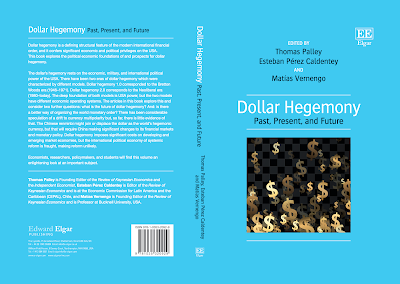Summary:
The dollar's hegemony rests on the economic, military, and international political power of the USA. There have been two eras of dollar hegemony which were characterized by different models. Dollar hegemony 1.0 corresponded to the Bretton Woods era (1946-1971). Dollar hegemony 2.0 corresponds to the Neoliberal era (1980-today). The deep foundation of both models is USA power, but the two models have different economic operating systems. The articles in this book explore this and consider two further questions: what is the future of dollar hegemony? And: is there a better way of organizing the world monetary order? There has been considerable speculation of a drift to currency multipolarity but, so far, there is little evidence of that. The Chinese renminbi might join or displace the
Topics:
Matias Vernengo considers the following as important: Benjamin J. Cohen, Dollar hegemony, Esteban Pérez, Palley, ROKE
This could be interesting, too:
The dollar's hegemony rests on the economic, military, and international political power of the USA. There have been two eras of dollar hegemony which were characterized by different models. Dollar hegemony 1.0 corresponded to the Bretton Woods era (1946-1971). Dollar hegemony 2.0 corresponds to the Neoliberal era (1980-today). The deep foundation of both models is USA power, but the two models have different economic operating systems. The articles in this book explore this and consider two further questions: what is the future of dollar hegemony? And: is there a better way of organizing the world monetary order? There has been considerable speculation of a drift to currency multipolarity but, so far, there is little evidence of that. The Chinese renminbi might join or displace the dollar as the world's hegemonic currency, but that will require China making significant changes to its financial markets and monetary policy. Dollar hegemony imposes significant costs on developing and emerging market economies, but the international political economy of systemic reform is fraught, making reform unlikely. The dollar's hegemony rests on the economic, military, and international political power of the USA. There have been two eras of dollar hegemony which were characterized by different models. Dollar hegemony 1.0 corresponded to the Bretton Woods era (1946-1971). Dollar hegemony 2.0 corresponds to the Neoliberal era (1980-today). The deep foundation of both models is USA power, but the two models have different economic operating systems. The articles in this book explore this and consider two further questions: what is the future of dollar hegemony? And: is there a better way of organizing the world monetary order? There has been considerable speculation of a drift to currency multipolarity but, so far, there is little evidence of that. The Chinese renminbi might join or displace the
Topics:
Matias Vernengo considers the following as important: Benjamin J. Cohen, Dollar hegemony, Esteban Pérez, Palley, ROKE
This could be interesting, too:
Matias Vernengo writes Paul Davidson (1930-2024) and Post Keynesian Economics
Matias Vernengo writes Challenges and Perspectives of International Monetary Policy
Matias Vernengo writes Paul Davidson (1930-2024)
Matias Vernengo writes Dollar dominance and the international monetary hierarchy

